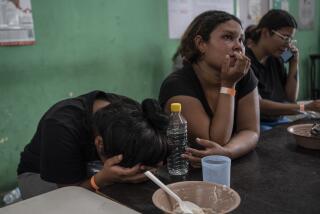Enrique’s Journey | Chapter Four: Along the Tracks: Why Give? ‘Because They Haven’t Eaten’
The girl runs down the narrow aisles of her father’s grocery, snatching crackers, water bottles and pastries off the shelves.
Gladys Gonzalez Hernandez waits for the diesel horn. There it is, at last! She runs outside. Gladys and her father, Ciro Gonzalez Ramos, wave up to the immigrants on board the train. She is 6 years old.
They stand along the tracks at Fortin de las Flores, in the Mexican state of Veracruz, and throw the crackers and the water and the pastries into the outstretched hands of the migrants.
Ciro Gonzalez, 35, taught Gladys to do this; he wants her to grow up right.
“Why do you give them food?” she asked him once. Her father said, “Because they have traveled far and haven’t eaten.”
No one recalls when it started, probably in the 1980s, when Central Americans, fleeing war and poverty, began riding the rails north in large numbers. Wherever the trains stopped, the immigrants went, gaunt and dirty, to front doors to beg. Occasionally one would fall off a train, weak with hunger.
Eventually people along the tracks, particularly in the state of Veracruz, began to bring food out to the trains, often where they slowed for curves or bad tracks. Those who had no food brought plastic bottles of tap water. As the procession of migrants has grown, so has the determination to help.
At 6 p.m. on a summer day, Jesus Gonzalez Roman, 40, and his sister Magdalena Gonzalez Roman, 31, sit outside their rail-side home in the town of Encinar. Neighbors come out to chat after long hours of work as bricklayers and field hands.
They hear a diesel horn.
Magdalena and her brother have two minutes. They run inside. Their mother, Esperanza Roman Gonzalez, 78, adjusts her pink apron and grabs her cane.
Jesus plucks three sweaters from a nylon bag, hand-me-downs from relatives.
Magdalena puts tortillas into an orange-colored bag, then snatches bread rolls and stuffs them into a blue bag. She ladles lemonade into a plastic bottle, spilling some in her haste.
The horn on the locomotive grows louder, more frequent.
At the stove, she scoops a bowl of stew into a plastic bag. “Ready?” she mutters. “We have bread, tortillas ... “ She dashes to the front room.
The horn blasts nearby.
Jesus and Magdalena race outside, where their mother is already hobbling past the wooden front gate, her long gray braids swinging.
It is dusk. Headlights glow on the train. It slows for a curve. The ground rumbles. Wheels pound. The engineer sounds the horn five times, warning the 20-odd people who have come out with food, drink and clothing to be very careful.
Jesus and Magdalena edge close to the tracks, dig in their heels and brace each other, so wind around the train will not suck them under the wheels.
Jesus spots immigrants on a hopper car. “Some are on top!” he yells. He waves the sweaters above his head.
A teen-ager in a green and white shirt edges down the ladder on the hopper. He holds on with his right hand and reaches out with his left.
Now seconds count.
Magdalena hands Jesus her blue bag of bread. He thrusts it up, along with the sweaters. A moment later, Magdalena pushes up a bottle of lemonade.
The youngster grabs everything.
“Gracias!” he yells above the din.
“Que Dios los lleve! May God watch over you!” Jesus shouts back, eyes smiling.
Esperanza stands silently, her hands stretched upward. She prays to the Virgin of Guadalupe, asking her to bring all the children on the train safely to their worried mothers in El Norte.
More to Read
Sign up for Essential California
The most important California stories and recommendations in your inbox every morning.
You may occasionally receive promotional content from the Los Angeles Times.










